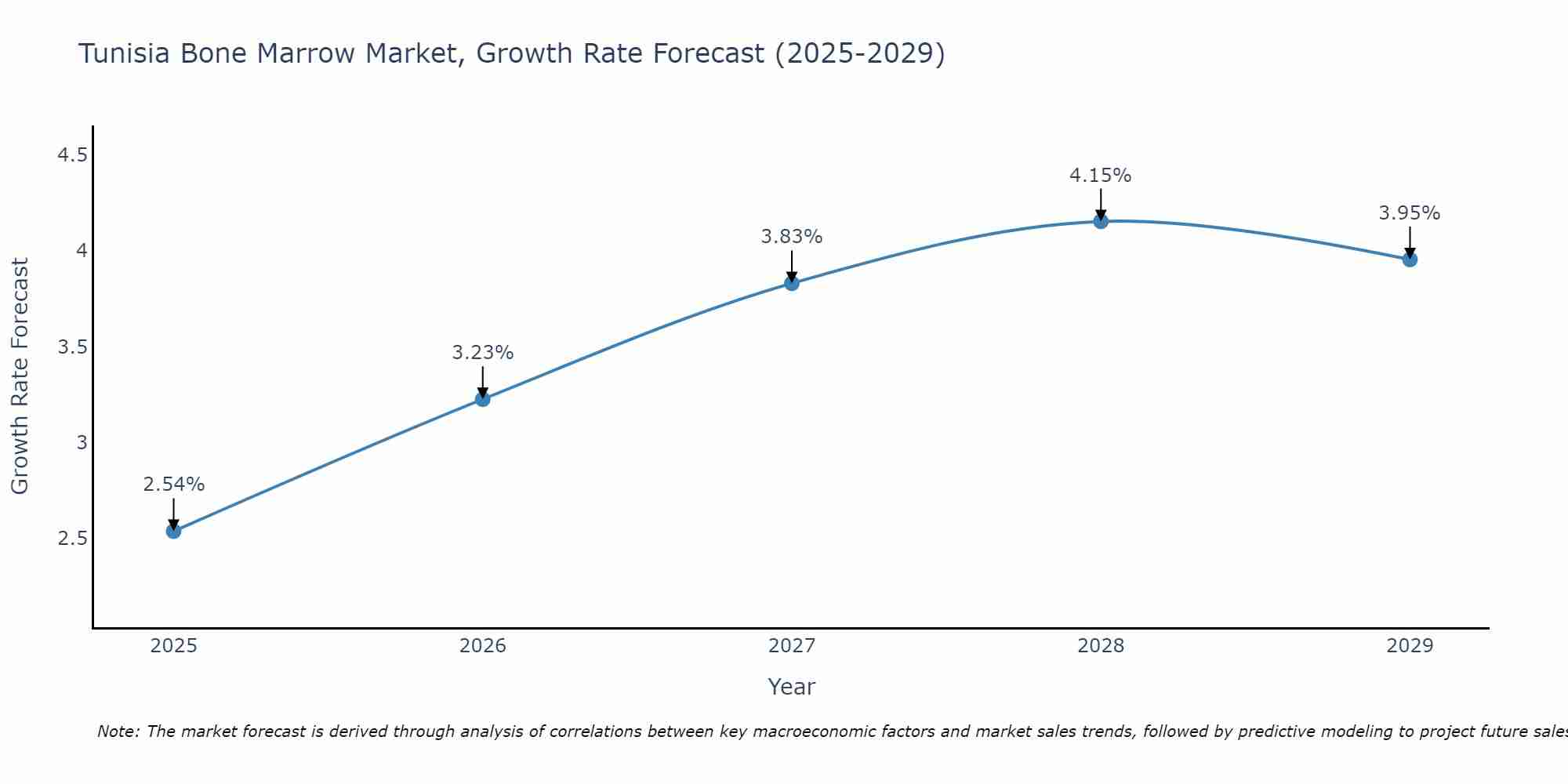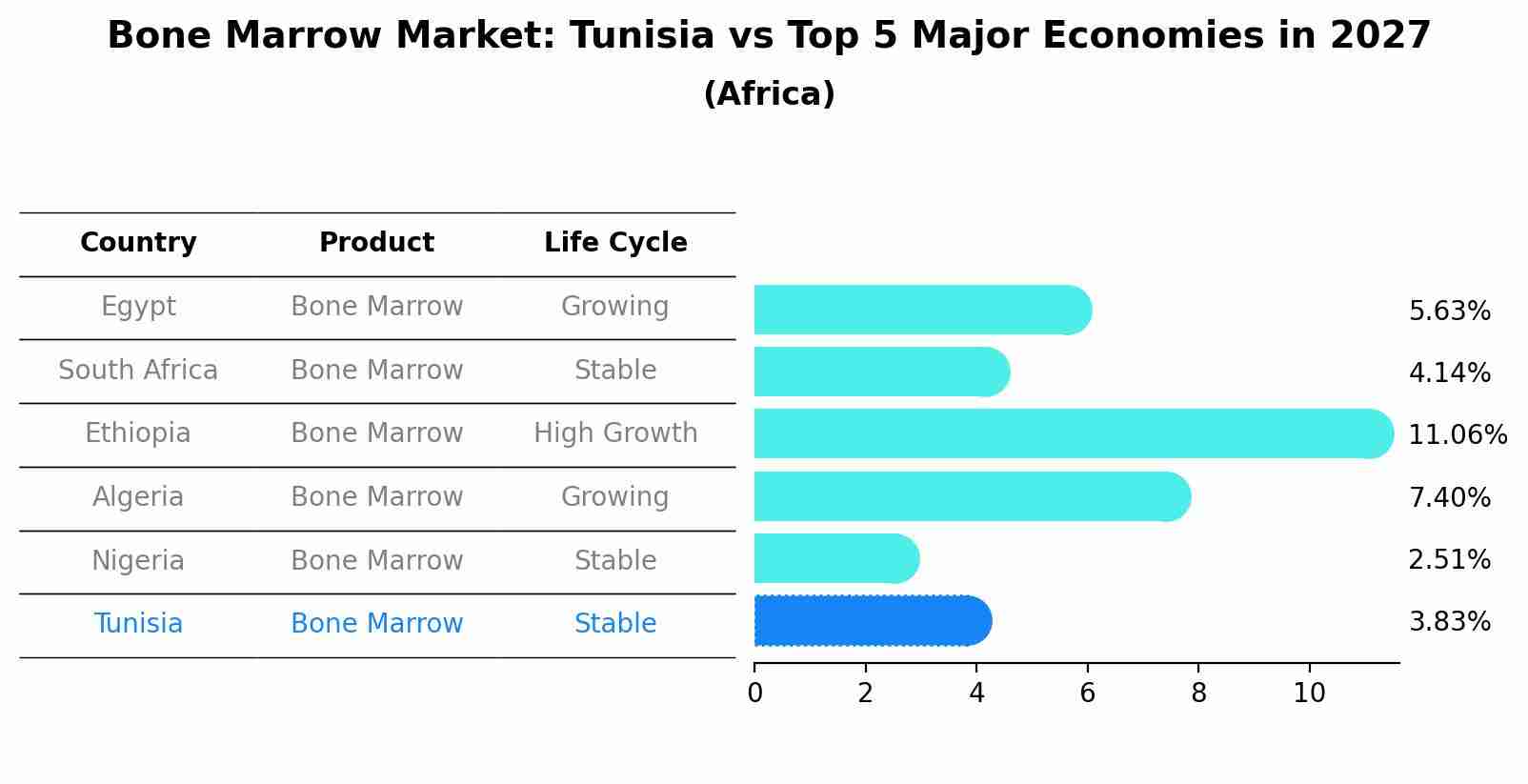Tunisia Bone Marrow Market Outlook | Revenue, COVID-19 IMPACT, Growth, Analysis, Industry, Value, Forecast, Companies, Share, Size & Trends
| Product Code: ETC409310 | Publication Date: Oct 2022 | Updated Date: Jul 2025 | Product Type: Market Research Report | |
| Publisher: 6Wresearch | Author: Vasudha | No. of Pages: 75 | No. of Figures: 35 | No. of Tables: 20 |
Tunisia Bone Marrow Market Size Growth Rate
The Tunisia Bone Marrow Market is projected to witness mixed growth rate patterns during 2025 to 2029. Starting at 2.54% in 2025, the market peaks at 4.15% in 2028, and settles at 3.95% by 2029.

Bone Marrow Market: Tunisia vs Top 5 Major Economies in 2027 (Africa)
The Bone Marrow market in Tunisia is projected to grow at a stable growth rate of 3.83% by 2027, within the Africa region led by Egypt, along with other countries like South Africa, Ethiopia, Algeria and Nigeria, collectively shaping a dynamic and evolving market environment driven by innovation and increasing adoption of emerging technologies.

Tunisia Bone Marrow Market Synopsis
The Tunisia Bone Marrow Market is characterized by a growing demand for bone marrow transplantation procedures due to increasing incidences of blood disorders and cancers. The market is primarily driven by advancements in medical technology, improving healthcare infrastructure, and rising awareness about the benefits of bone marrow transplant. Private healthcare institutions and government hospitals are the primary providers of bone marrow transplant services in the country. However, limited availability of matching donors and high costs associated with the procedure are major challenges faced by patients seeking bone marrow transplants in Tunisia. The market is expected to witness steady growth in the coming years as investments in healthcare infrastructure and awareness campaigns continue to drive the adoption of bone marrow transplant procedures.
Tunisia Bone Marrow Market Trends
Currently, the Tunisia Bone Marrow Market is witnessing a growing demand for bone marrow transplants due to the increasing prevalence of blood disorders, such as leukemia and lymphoma, in the country. The advancements in medical technology, including improved diagnostic techniques and transplantation procedures, have also contributed to the rising trend. Additionally, there is a growing focus on expanding the bone marrow donor registry in Tunisia to ensure a larger pool of potential donors for patients in need of transplants. The healthcare system in Tunisia is also working towards enhancing infrastructure and expertise in the field of bone marrow transplantation to meet the growing demand and provide better outcomes for patients. Overall, the market is expected to continue growing as awareness about the importance of bone marrow transplants increases and access to these treatments improves.
Tunisia Bone Marrow Market Challenges
In the Tunisia Bone Marrow Market, one of the main challenges faced is the limited availability of matching donors. This scarcity can make it difficult for patients in need of bone marrow transplants to find suitable donors, leading to delays in treatment and potential negative health outcomes. Additionally, there is a lack of awareness and education among the general population regarding the importance of bone marrow donation, resulting in a smaller pool of potential donors. The high cost of conducting bone marrow transplants and the limited infrastructure for such procedures in Tunisia also pose significant challenges for patients seeking treatment. Overall, addressing these challenges through increased donor recruitment efforts, raising awareness about bone marrow donation, and investing in healthcare infrastructure are crucial steps needed to improve the bone marrow market in Tunisia.
Tunisia Bone Marrow Market Investment Opportunities
The Tunisia Bone Marrow Market presents opportunities for investment in various segments such as bone marrow transplant centers, stem cell research and therapy, and bone marrow donation services. With a growing demand for bone marrow transplants to treat various diseases such as leukemia, lymphoma, and other blood disorders, investing in specialized transplant centers can be lucrative. Additionally, advancements in stem cell research and therapy offer potential for innovative treatment options and further market growth. Investing in bone marrow donation services can also be a promising opportunity, as increasing awareness about the importance of bone marrow donation can drive the demand for donors and related services. Overall, the Tunisia Bone Marrow Market offers a range of investment opportunities in both healthcare services and research sectors.
Jordan Agar Market Government Policies
Government policies related to the Tunisia Bone Marrow Market focus on regulating the donation and transplantation of bone marrow to ensure ethical practices and patient safety. The National Bioethics Committee of Tunisia oversees the legal framework for bone marrow donation, emphasizing voluntary and non-commercial aspects of donation. The law prohibits the sale of bone marrow and requires informed consent from donors. Additionally, there are regulations in place to protect the rights of both donors and recipients, including confidentiality and non-discrimination. The government also works to promote awareness and education about bone marrow donation through public campaigns and partnerships with healthcare providers. Overall, the policies aim to ensure a transparent and ethical bone marrow market in Tunisia.
Tunisia Bone Marrow Market Future Outlook
The Tunisia Bone Marrow Market is expected to witness steady growth in the coming years, driven by factors such as increasing awareness about bone marrow transplants, advancements in medical technology, and a growing number of patients diagnosed with blood disorders and cancers that require bone marrow transplants. Additionally, the government`s initiatives to improve healthcare infrastructure and services are likely to further boost the market. However, challenges such as limited availability of suitable donors and high costs associated with the procedure may hinder the market growth to some extent. Overall, with ongoing research and development activities in the field of bone marrow transplants, coupled with increasing investment in healthcare facilities, the Tunisia Bone Marrow Market is projected to expand and offer more treatment options for patients in need of such procedures.
Key Highlights of the Report:
- Tunisia Bone Marrow Market Outlook
- Market Size of Tunisia Bone Marrow Market, 2021
- Forecast of Tunisia Bone Marrow Market, 2031
- Historical Data and Forecast of Tunisia Bone Marrow Revenues & Volume for the Period 2018 - 2031
- Tunisia Bone Marrow Market Trend Evolution
- Tunisia Bone Marrow Market Drivers and Challenges
- Tunisia Bone Marrow Price Trends
- Tunisia Bone Marrow Porter's Five Forces
- Tunisia Bone Marrow Industry Life Cycle
- Historical Data and Forecast of Tunisia Bone Marrow Market Revenues & Volume By Transplantation Type for the Period 2018 - 2031
- Historical Data and Forecast of Tunisia Bone Marrow Market Revenues & Volume By Allogeneic Bone Marrow Transplantation for the Period 2018 - 2031
- Historical Data and Forecast of Tunisia Bone Marrow Market Revenues & Volume By Autologous Bone Marrow Transplantation for the Period 2018 - 2031
- Historical Data and Forecast of Tunisia Bone Marrow Market Revenues & Volume By Disease Indication for the Period 2018 - 2031
- Historical Data and Forecast of Tunisia Bone Marrow Market Revenues & Volume By Lymphoma for the Period 2018 - 2031
- Historical Data and Forecast of Tunisia Bone Marrow Market Revenues & Volume By Leukemia for the Period 2018 - 2031
- Historical Data and Forecast of Tunisia Bone Marrow Market Revenues & Volume By Myeloma for the Period 2018 - 2031
- Historical Data and Forecast of Tunisia Bone Marrow Market Revenues & Volume By Myelodysplasia for the Period 2018 - 2031
- Historical Data and Forecast of Tunisia Bone Marrow Market Revenues & Volume By Aplastic Anemia for the Period 2018 - 2031
- Historical Data and Forecast of Tunisia Bone Marrow Market Revenues & Volume By Sickle Cell Anemia for the Period 2018 - 2031
- Historical Data and Forecast of Tunisia Bone Marrow Market Revenues & Volume By Solid Tumors for the Period 2018 - 2031
- Historical Data and Forecast of Tunisia Bone Marrow Market Revenues & Volume By Others for the Period 2018 - 2031
- Historical Data and Forecast of Tunisia Bone Marrow Market Revenues & Volume By End User for the Period 2018 - 2031
- Historical Data and Forecast of Tunisia Bone Marrow Market Revenues & Volume By Hospitals for the Period 2018 - 2031
- Historical Data and Forecast of Tunisia Bone Marrow Market Revenues & Volume By Multi-specialty Clinics for the Period 2018 - 2031
- Historical Data and Forecast of Tunisia Bone Marrow Market Revenues & Volume By Ambulatory Surgical Centers for the Period 2018 - 2031
- Tunisia Bone Marrow Import Export Trade Statistics
- Market Opportunity Assessment By Transplantation Type
- Market Opportunity Assessment By Disease Indication
- Market Opportunity Assessment By End User
- Tunisia Bone Marrow Top Companies Market Share
- Tunisia Bone Marrow Competitive Benchmarking By Technical and Operational Parameters
- Tunisia Bone Marrow Company Profiles
- Tunisia Bone Marrow Key Strategic Recommendations
Frequently Asked Questions About the Market Study (FAQs):
- Single User License$ 1,995
- Department License$ 2,400
- Site License$ 3,120
- Global License$ 3,795
Search
Related Reports
- Portugal Electronic Document Management Market (2025-2031) | Strategy, Consumer Insights, Analysis, Investment Trends, Opportunities, Growth, Size, Share, Industry, Revenue, Segments, Value, Segmentation, Supply, Forecast, Restraints, Outlook, Competition, Drivers, Trends, Demand, Pricing Analysis, Competitive, Strategic Insights, Companies, Challenges
- France Electronic Document Management Market (2025-2031) | Strategy, Consumer Insights, Analysis, Investment Trends, Opportunities, Growth, Size, Share, Industry, Revenue, Segments, Value, Segmentation, Supply, Forecast, Restraints, Outlook, Competition, Drivers, Trends, Demand, Pricing Analysis, Competitive, Strategic Insights, Companies, Challenges
- Portugal Occupational Health & Safety Services Market (2025-2031) | Strategy, Consumer Insights, Analysis, Investment Trends, Opportunities, Growth, Size, Share, Industry, Revenue, Segments, Value, Segmentation, Supply, Forecast, Restraints, Outlook, Competition, Drivers, Trends, Demand, Pricing Analysis, Competitive, Strategic Insights, Companies, Challenges
- Netherlands Occupational Health and Safety Services Market (2025-2031) | Strategy, Consumer Insights, Analysis, Investment Trends, Opportunities, Growth, Size, Share, Industry, Revenue, Segments, Value, Segmentation, Supply, Forecast, Restraints, Outlook, Competition, Drivers, Trends, Demand, Pricing Analysis, Competitive, Strategic Insights, Companies, Challenges
- Belgium and Luxembourg Facility Management Market (2025-2031) | Strategy, Consumer Insights, Analysis, Investment Trends, Opportunities, Growth, Size, Share, Industry, Revenue, Segments, Value, Segmentation, Supply, Forecast, Restraints, Outlook, Competition, Drivers, Trends, Demand, Pricing Analysis, Competitive, Strategic Insights, Companies, Challenges
- Russia Women Intimate Apparel Market (2025-2031) | Strategy, Consumer Insights, Analysis, Investment Trends, Opportunities, Growth, Size, Share, Industry, Revenue, Segments, Value, Segmentation, Supply, Forecast, Restraints, Outlook, Competition, Drivers, Trends, Demand, Pricing Analysis, Competitive, Strategic Insights, Companies, Challenges
- Africa Chocolate Market (2025-2031) | Size, Share, Trends, Growth, Revenue, Analysis, Forecast, industry & Outlook
- Global Hydroxychloroquine And Chloroquine Market (2025-2031) | Industry, Trends, Size, Outlook, Growth, Value, Companies, Revenue, Analysis, Share, Forecast
- Saudi Arabia Plant Maintenance Market (2025-2031) | Industry, Size, Growth, Revenue, Value, Companies, Forecast, Analysis, Share & Trends
- Taiwan Electric Truck Market (2025-2031) | Outlook, Industry, Revenue, Size, Forecast, Growth, Analysis, Share, Companies, Value & Trends
Industry Events and Analyst Meet
Our Clients
Whitepaper
- Middle East & Africa Commercial Security Market Click here to view more.
- Middle East & Africa Fire Safety Systems & Equipment Market Click here to view more.
- GCC Drone Market Click here to view more.
- Middle East Lighting Fixture Market Click here to view more.
- GCC Physical & Perimeter Security Market Click here to view more.
6WResearch In News
- Doha a strategic location for EV manufacturing hub: IPA Qatar
- Demand for luxury TVs surging in the GCC, says Samsung
- Empowering Growth: The Thriving Journey of Bangladesh’s Cable Industry
- Demand for luxury TVs surging in the GCC, says Samsung
- Video call with a traditional healer? Once unthinkable, it’s now common in South Africa
- Intelligent Buildings To Smooth GCC’s Path To Net Zero













